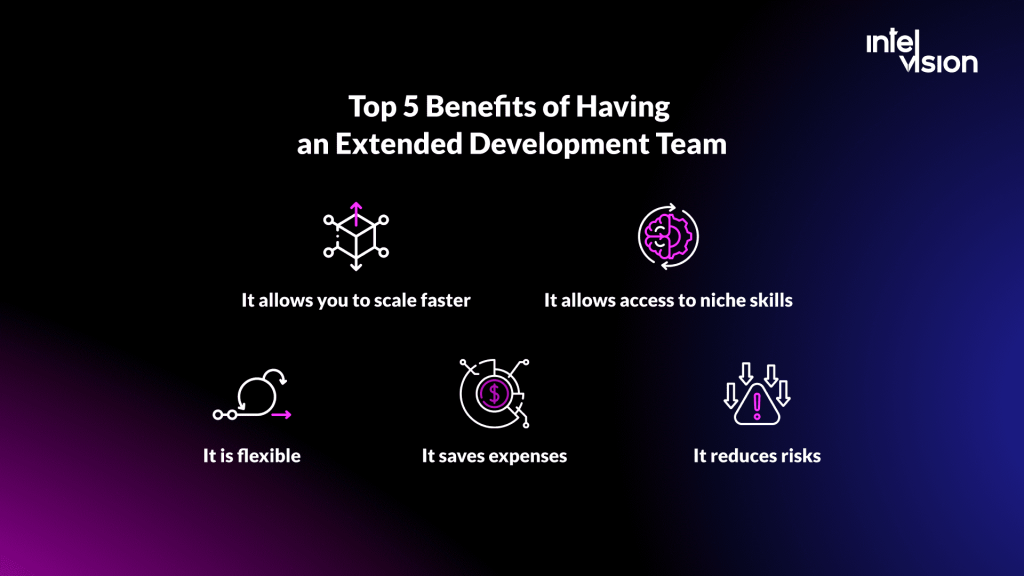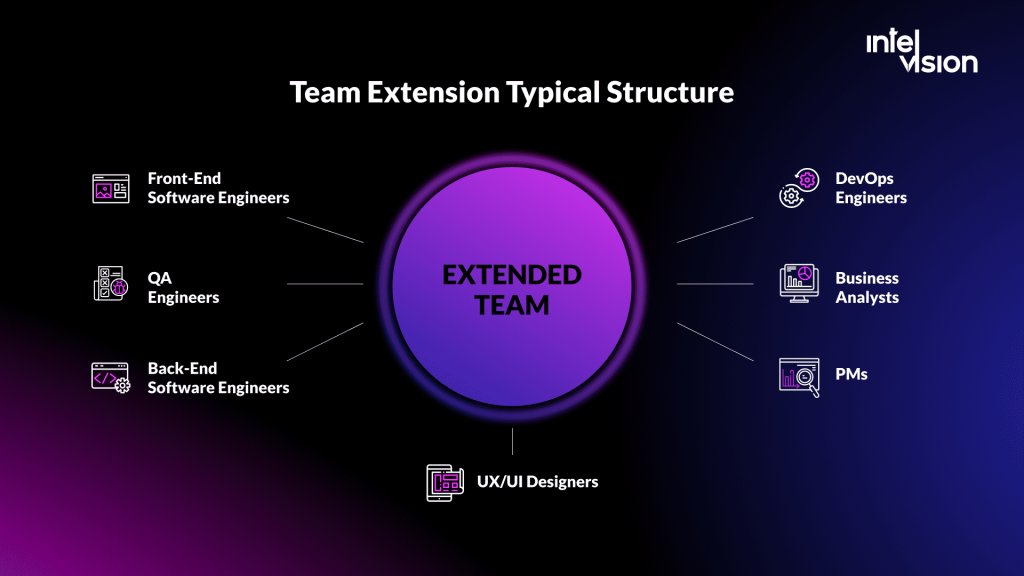
How to Extend Your Software Development Team
Let’s imagine your business idea is well-validated and put to real life, and your software developers work hard to make your product function so it’s picture-perfect. However, with the business growth, the volume of development of the solution grows accordingly, and the marketplace or customers, or investors demand actual results and here you have to face another challenge. You need more people on board to achieve the business goals.
Software team extension might be a way to add extra talent to your development team. With developed countries facing technical talent shortages, many companies use alternative hiring methods. Deloitte’s projection that global spending in the IT outsourcing/team extension industry will hit $917 billion in 2023 shows the attractiveness of this staffing approach.
In this article, we will highlight how to extend your software development team wisely to multiply your business’s bottom line.
How Does Team Extension Work
Software team extension involves engaging external dedicated developers to fully commit their time and skills to your company. While a dedicated development team focuses on a specific project and ends its service upon the agreed timeline, an extension of your team works as if specialists are your permanent employees. They adapt to company culture, strive towards the same goals, and are a part of the bigger team.
When to Hire Outsourced IT Professionals
We’ve highlighted several conditions when the extended team will work best.
- You have many projects. When another product needs to be developed at the same time as the main one, but it isn’t possible to separate or scale the internal team, you should consider a team extension. The constant switching of the in-house team between two projects can lead to a drop in productivity in the development of both software solutions.
- You are faced with the need to quickly scale. If your HR department is not ready for a rapid increase in the development staff, the perfect option is to expand the core team with outsourced developers using the Team Extension model.
- Your deadlines are burning, and meeting the planned deadlines is extremely difficult. When it becomes clear that the project cannot be completed within the originally planned time frame, and internal developers cannot cope with the scope of work, you should resort to expanding the software development team.
- You need specific competencies. Some projects require dedicated developers to immerse themselves in the subject area for a long time and build up expertise in a particular technology. For example, to develop a FinTech solution, it’d be efficient to involve skilled developers in this field. It’s easier, cheaper, and faster than training your developers.
- You have no development management experience. Sometimes a software development company has an IT department that regularly performs its duties but does not have experience in developing software products from A to Z. Some firms lack a development management infrastructure or don’t have an HR department to motivate developers. In this case, it is better to hire external professionals using the Team Extension model.
Top 5 Benefits of Having an Extended Development Team
Doubt the effectiveness of the Team Extension model and are already developing strategies for recruiting in-house tech talent? Here’s how an extended team can help you improve processes and increase business profitability when implemented correctly:
It Allows You To Scale Faster
Team extension solves the predicament of finding the right technical talent for a growing company. This allows firms to focus on marketing, management, and expansion, instead of being mired in the technicalities of recruiting outsourced developers.
It Is Flexible
The extended team doesn’t necessarily report to work on-premise. Instead, your software developers can work from any part of the world and still be reachable.
It Allows Access To Niche Skills
You might need help hiring an experienced cloud security specialist or a developer who knows how to create a compliance FinTech app development. In such cases, team extension allows you to tap into a global talent pool and hire dedicated developers with specific expertise, skills, and level.
It Saves Expenses
Companies based in the US, UK, Australia, and Germany pay high salaries when hiring local software developers. They can significantly reduce expenses using the team extension model and hiring equally-capable developers at a lower fee—for example, from Eastern Europe.
It Reduces Risks
An extended team is fully committed to the company and its vision. It mitigates risks in building, releasing, and supporting complex software products.
How to Make Team Extension Effective
Even with significant benefits, expanding the software development team with external specialists may not bring results. On the contrary, in some cases, it can even worsen established processes. Intelvision skilled developers have shared how to ensure the effectiveness of the team extension in your company.
*These are just basic tips. For a detailed consultation, contact us. We will share the advantages and nuances of the extended team model that will suit your business the most.
Define Project Goals
Consider why you are setting up an extended team in the first place. Do you need additional help managing an existing software product? Do you need to personalize features for different markets?
Stating your business goals helps in shortlisting suitable candidates. This is also important because team extension requires a long-term commitment from both parties. Accordingly, the hired tech specialists should match your skills, experience, and corporate culture, as well as share the values of the project or the company as a whole.
Define the Scope of Work
Extended team members need to be aware of their IT roles. So, pen down the job scope in detail and leave no room for misinterpretations.
Determine Your Technological Profile
Dedicated developers come with different skill sets. To hire the right ones, identify which technological stacks are important for your project. For example, you might need software developers with Python, Django, and a good understanding of API to build backend apps.
Establish Transparent Communication
The SHRM community has found that American businesses with 100 employees lose $420.000 annually due to poor communication culture. Decide how you’ll share information, coordinate projects, assign tasks, and receive feedback before hiring the developers.
Team Extension Typical Structure
Outsourced team structure depends on your business needs and objectives. If you need the checklist to start, here is the typical structure of the extended team:
- Front-End Software Engineers are engaged in the user interface development, or the part of the website or application users see.
- Back-End Software Engineers deal with the software and administrative part of the web app, the internal content of the system, or server technologies such as database, architecture, and program logic;
- QA Engineers monitor the quality of the product at all stages of its development;
Any software, website, or app requires a quality check before being released. Developers don’t always understand how the user will interact with the product, and also cannot foresee all non-standard cases in his work. Then Quality Assurance Engineers come to the rescue. The testers check the software for defects and help to fix them.
- UX/UI Designers create user-friendly, and aesthetic user interfaces. They develop a product so that it is as effective as possible, solves the main problems and tasks of users;
Drawing an analogy with handwriting, your handwriting, the color of the pen, and the type of paper can be called UI. The UX in this case will be influenced by the meanings you put into your words, as well as the ease of perceiving your message.
- DevOps Engineers are responsible for the use of the methodology of the same name within the software development company. They understand programming and infrastructure as well as combine this knowledge to run the business optimally;
- Business Analysts explore the customer’s problem, look for a solution and draw up its concept in the form of requirements that developers will be guided;
A business analyst analyzes the whole picture: at what stage is the product and the team, what elements does the solution consist of, what positively affects it, how this influence should be implemented, etc.
- PMs manage the project as a whole: prioritize, plan tasks, communicate with the team and the client, and quickly solve problems on the project.
How to Choose a Trusted Team Extension Partner
There are basic principles for hiring an extended team. Firstly, you should check that extended team members are a perfect project fit and possess deep expertise in their field. Before hiring, ensure the chosen specialists can dedicate their full attention to your project.
Check the Expertise
You can reduce the level of uncertainty and pressure by finding the right people who possess deep expertise. They can address all these challenges and bring your overall project’s effectiveness to a new level.
Establish Direct Control Over an Extended Team
Be ready to manage the constant flow of technical improvements, edit various types of strategic and tactical decision-making, and more.
We also recommend looking for software development companies that have been working in IT for well over five years.
For example, Intelvision offers full-cycle IT solutions and consulting services for individuals, startups, and small to medium businesses for 5+ years. Our customers are based in Canada, the US, the UK, Israel, Arab Emirates, South Africa, Australia, and more.
We’ve completed 100+ projects requiring expertise in different programming languages and domains. You can be sure that custom software development with Intelvision guarantees the quality of your IT products, streamlines business processes, and saves R&D costs.
Things to Consider Before Extending Your Software Development Team
Time Zone Differences Are Critical
We at Intelvision have a wealth of experience with large hourly differences, up to 14 hours. The most important thing in a distributed team is proper communication. However, any communication is broken by time zone differences. Issues are resolved for a long time, requests are processed and changes are accepted slowly. A task that would be solved in an office in an hour can be solved in a distributed team with a large hourly difference in 2–3 days.
Therefore, we recommend you choose software development companies that allow you to cross time zones with developers at least six hours a day. However, if you have extensive experience in managing a distributed team, the difference in time zones can be big. If you are not used to working in a flexible mode, be sure to include a manager who will be responsible for the effectiveness of communication channels/planning.
Get to Know the Vendor Better
Arrange a meeting with the service provider’s CTO. On the one hand, the CTO is the decision maker, and on the other hand, he is the chief technology specialist. If you find a common language with a CTO, you will be able to understand much better how development processes in the team you’ll be potentially working with are built.
Onboarding
Without proper onboarding, you can end up with serious problems. What you need to do when hiring external professionals:
- share the details on the project they will be working on;
- get to know the internal company’s culture;
- present them to your in-house team.
Soft Skills
In distributed teams, soft skills play no less a role than hard skills. Nowadays, experienced professionals need to develop soft skills such as:
- project management;
- self-management;
- the ability to work under pressure;
- interpersonal/inter-functional communication;
- presentation skills;
- creative thinking.
Soft skills became critically important because people have realized: work problems are not related to the fact that a person is not professional. They are rather related to the fact that tech specialist doesn’t know how to interact with the team.
Let’s imagine an experienced developer. Everyone considers him a guru, but no one wants to cooperate closely with him. In case of any issues, he blames the client, project managers, and QA engineers, but not himself. It turns out that the experience and professionalism are depreciated simply because it is uncomfortable to interact with a person like that.
The Cost of Team Extension Services
The budget size largely depends on the region where developers are based. For example, a US company augmenting its team with US developers pays an average of $101,792 per year. Meanwhile, the salary for developers in Asia or Eastern Europe varies. They make $3,5–9,832 per month. It’s better to search for a team extension in Europe, where a remote team will be fluent English speakers. In addition, the difference in mentality will not be significant.
To Conclude
The success of any project largely depends on the team. Therefore, it is very important to be able to timely involve experienced professionals with the necessary qualifications in the development. Unfortunately, finding them quickly is one of the most difficult tasks that every leader faces. To solve this problem, you can partially expand the internal team with external specialists (Team Extension).
If you are looking for some extra workforce to develop innovative software to boost your growth, check out our Team Extension Model page to get familiar with the full list of services and benefits you might get while collaborating with Intelvision.











![$portfolio_img_mobile['title'] $portfolio_img_mobile['alt']](https://intelvision.pro/wp-content/uploads/2022/11/Visoplan.-Mobile-banner-263x350.png)









